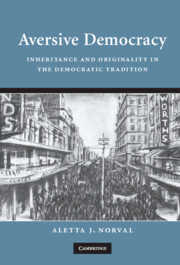Book contents
- Frontmatter
- Contents
- Acknowledgements
- Introduction: towards an aversive account of democracy
- 1 Democracy, universalization and (dis)agreement
- 2 Democratic argumentation: rhetoric and imagination
- 3 Democratic identification and aspect change
- 4 Democratic subjectivity: the promise of democratic community
- 5 Conclusion: aversive democracy – exemplarity, imagination and passion
- Bibliography
- Index
5 - Conclusion: aversive democracy – exemplarity, imagination and passion
Published online by Cambridge University Press: 22 September 2009
- Frontmatter
- Contents
- Acknowledgements
- Introduction: towards an aversive account of democracy
- 1 Democracy, universalization and (dis)agreement
- 2 Democratic argumentation: rhetoric and imagination
- 3 Democratic identification and aspect change
- 4 Democratic subjectivity: the promise of democratic community
- 5 Conclusion: aversive democracy – exemplarity, imagination and passion
- Bibliography
- Index
Summary
The point is not to win an argument (that may come late in the day) but to manifest for the other another way.
In this concluding chapter, I draw together the threads of the argument that constitute the grammar of what I have called aversive democracy. On the one hand, this grammar includes the vocabularies we use and the practices we engage in. But it also relates to the way these delimit the ‘say-able’ and the ‘do-able’ – that which is intelligible to us at any point in time. And finally, it concerns the possibility of challenges to existing grammars by new democratic claims, which may transform – or indeed, affirm – this grammar. Throughout I have foregrounded the importance of both the terms of argumentation and its structure. However, I have also sought to go beyond these more traditional concerns so as to consider both the rhetoricality of our practices and their bodily visceral character. In addition to this refocusing of democratic grammar, I have also sought to unpack the role of subjectivity in a democratic grammar by focusing on the importance of identification with a grammar as well as the logic of its embedding and challenges to existing grammars. I have argued that identification is important in accounting for the constitution of the democratic subject, and it is here that the emergence of new claims, as well as the different forms of relation constituted amongst democratic subjects, has received attention. Rancière and Laclau provided the starting-point here.
- Type
- Chapter
- Information
- Aversive DemocracyInheritance and Originality in the Democratic Tradition, pp. 187 - 214Publisher: Cambridge University PressPrint publication year: 2007



